Related Research Articles

The University of St. Michael's College is federated with the University of Toronto. It was founded in 1852 by the Congregation of St. Basil and retains its Catholic affiliation through its postgraduate theology faculty. However, it is primarily an undergraduate college for liberal arts and sciences.

The Vatican Apostolic Library, more commonly known as the Vatican Library or informally as the Vat, is the library of the Holy See, located in Vatican City, and is the city-state's national library. It was formally established in 1475, although it is much older—it is one of the oldest libraries in the world and contains one of the most significant collections of historical texts. It has 75,000 codices from throughout history, as well as 1.1 million printed books, which include some 8,500 incunabula.
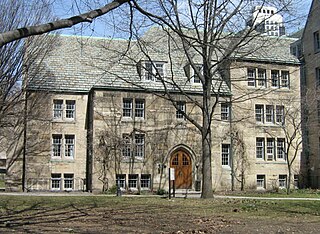
The Pontifical Institute of Mediaeval Studies (PIMS) is a research institute in the University of Toronto that is dedicated to advanced studies in the culture of the Middle Ages.
Medieval studies is the academic interdisciplinary study of the Middle Ages. A historian who studies medieval studies is called a medievalist.
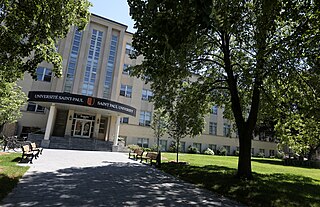
Saint Paul University is a bilingual Catholic university federated with the University of Ottawa since 1965. It is located on Main Street in Canada's capital city, Ottawa, Ontario. Fully bilingual, it offers instruction in both of the country's official languages: French and English. The university has been entrusted for over a century and a half to the Congregation of the Missionary Oblates of Mary Immaculate. In August 1866, the university was endowed a civil charter that was passed by the government of the Province of Canada. It later received a pontifical declaration promulgated by Pope Leo XIII on 5 February 1889.
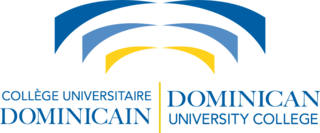
The Dominican University College is a bilingual university located in Ottawa, Ontario, Canada. Since 2012, Dominican University College has been an affiliated college of Carleton University.
Marie-Dominique Chenu was a Catholic theologian and one of the founders of the reformist journal Concilium.

Raymond James Long is an American academic and professor emeritus of philosophy at Fairfield University in Fairfield, Connecticut. He is also a faculty member at St. John Fisher Seminary in Stamford, Connecticut. Long was the president of the Society for Medieval and Renaissance Philosophy.
Robert Holcot, OP was an English Dominican scholastic philosopher, theologian and influential Biblical scholar.

Giuseppe Garampi was an Italian scholar and collector of documents and books.
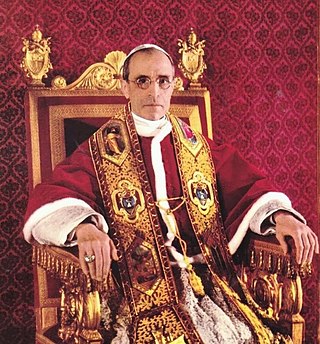
The cardinal electors in the 1939 papal conclave numbered 62 and all of them participated. They are arranged by region, and within each alphabetically.
Jeffrey F. Hamburger is an American art historian specializing in medieval religious art and illuminated manuscripts. In 2000 he joined the faculty of Harvard University, where in 2008 he was appointed the Kuno Francke Professor of German Art and Culture. Hamburger received his B.A., M.A and Ph.D from Yale and has previously held professorships at Oberlin College and the University of Toronto. Elected a Fellow of the Medieval Academy in 2001, he has won numerous awards for his publications, among them: the Charles Rufus Morey Prize of the College Art Association (1999), the Roland H. Bainton Book Prize in Art & Music (1999), the Otto Gründler Prize of the International Congress on Medieval Studies (1999), the Jacques Barzun Prize in Cultural History of the American Philosophical Society (1998), the John Nicholas Brown Prize of the Medieval Academy of America (1994), and the Gustave O. Arlt Award in the Humanities of the American Council of Graduate Schools (1991). His research has been supported by fellowships from the Guggenheim Foundation, the American Philosophical Society, the Institute for Advanced Study, the National Endowment for the Humanities, the Center for Advanced Study in the Visual Arts, and the Alexander von Humboldt Foundation. In 2009 Hamburger was elected a member of the American Academy of Arts and Sciences and in 2010, of the American Philosophical Society. In 2015 he was awarded an Anneliese Maier Research Award by the Alexander von Humboldt Foundation. In 2022 he was awarded the Gutenberg Prize of the City of Mainz and the Internationale Gutenberg-Gesellschaft.
Patrick Osmund Lewry was an English Dominican who made significant contributions to the history of logic and the philosophy of language in the thirteenth century. Lewry studied mathematical logic under Lejewski and A.N. Prior at Manchester (1961–2). From 1962–7 he taught the philosophy of language and logic at Hawkesyard. He was assigned to the Oxford Blackfriars in 1967. Dissatisfaction with teaching led him to work for an Oxford D.Phil. on the logic teaching of Robert Kilwardby. In 1979 he began the study of the history of grammar, logic and rhetoric at Oxford in the period 1220–1320. In 1979 he went to the Pontifical Institute of Mediaeval Studies in Toronto first as a research associate, then as a senior fellow. He died on 23 April 1987 at the age of 57 at the Oxford Dominican House.

Eugene Martin Nugent is an Irish Roman Catholic prelate who has served as Apostolic Nuncio to Bahrain, Kuwait and Qatar since January 2021.
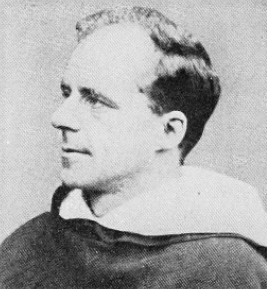
Henry Vincent Pope, better known as Fr. Hugh Pope (1869–1946), was an English Dominican biblical scholar, Professor of New Testament Exegesis at the Pontificium Collegium Internationale Angelicum, the future Pontifical University of Saint Thomas Aquinas, Angelicum in Rome.
Daniel Callus (1888–1965) was a Maltese historian and philosopher. His main interest was in the history of Medieval philosophy.
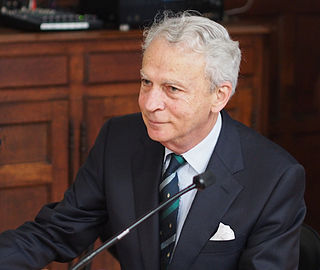
Brian Stock is an American historian. He is a historian of modes of perception between the ancient world and the sixteenth century. He was Rouse Ball Student at Trinity College, Cambridge, and Senior Fellow at the Pontifical Institute of Mediaeval Studies, Toronto, before joining the graduate faculty of the University of Toronto, where he taught history and literature until 2007. He is a Canadian and French citizen.

Benoît Lacroix was a Quebec theologian, philosopher, Dominican priest, professor in medieval studies and historian of the Medieval period, and author of almost 50 works and a great number of articles.
Samuel Presbiter was a theologian, a student of William de Montibus at the cathedral school in Lincoln, England.
James P. Carley is a Canadian historian of English history and bibliographer, currently a Distinguished Research Professor at York University and a Fellow of the Royal Society of Canada. He specializes in the history and provenance of medieval English manuscripts and the early Tudor period.
References
- 1 2 3 English, Edward D. (2001). "Leonard E. Boyle, OP (1923-99)". Renaissance Studies. 15 (3): 367–374. ISSN 0269-1213. JSTOR 24413249.
- ↑ Doyle, Jim (13 November 2018). "Birth of Father Leonard Eugene Boyle". seamus dubhghaill. Retrieved 30 May 2023.
- ↑ "Rev. Fr. Father Leonard Eugene Boyle (b. 13/Nov/1923, d. 25/Oct/1999)". Genealogy.com. Retrieved 27 December 2016.
- ↑ Honan, William H. (28 October 1999). "Leonard E. Boyle Dies at 75; Modernized Vatican Library". The New York Times. ISSN 0362-4331 . Retrieved 5 January 2023.
- ↑ "Father Leonard E. Boyle". The Governor General of Canada. Retrieved 30 May 2023.
- ↑ Mendelsohn, Daniel (2 January 2011). "God's Librarians: The Vatican Library Enters the 21st Century". The New Yorker. p. 27.
- ↑ "Obituary: The Rev Leonard Boyle". The Independent. 2 November 1999. Retrieved 30 May 2023.